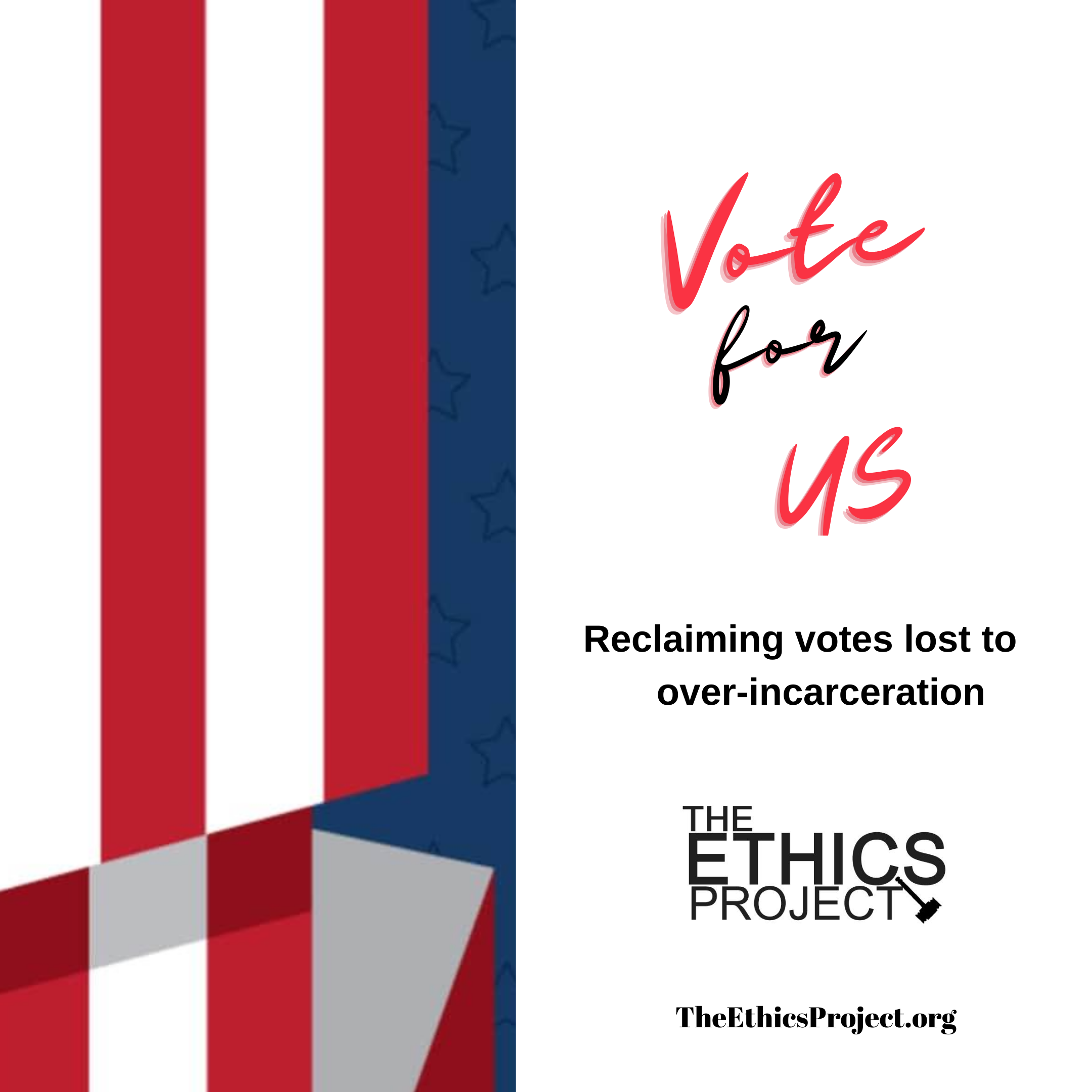VOTE FOR Us
VOTE FOR Us
VOTE FOR Us
Voting matters and each election year, over 2.2 million Americans disenfranchised through mass incarceration. Their votes, having no correlation to the purported crimes committed, are not only lost to the individual but to the entire community.
With African Americans and Hispanics making up a disproportionate number of prison populations, often wrongfully convicted and more often than not for low-level, non-violent offenses, their lost votes disproportionately impact the policies that systematically harm communities of color and changes the balance of power. Consider the facts below.
The Ethics Project encourages anyone who is unable to vote due to incarcerations, age, citizenship, or other factors, to participate in the voting process by encouraging others to register to vote, learn the issues and candidates, and then VOTE like our lives depend on it; in thousands of instances, they do.

6.1 million Americans can not vote due to felony disenfranchisement
1 out 13 of every African American has lost the right to vote due to felony disenfranchisement
Nearly a half-million people in pre-trial detention can but do not vote while detained.
11 states prohibit voting even after an individual has completed their sentence.
Only 2 of 50 US states grants everyone the right to vote regardless of convictions, Vermont and Maine.
Iowa permanently denies the right to vote to anyone with a felony conviction.
Only 3 states automatically restore the right to vote after discharge from parole, California, Louisianna, and Connecticut.
In 3 states, one in five African Americans is unable to vote due to convictions, Florida, Kentucky, and Virginia.
Thousands of polling places have been closed since the Voting Rights Act was weakened by the US Supreme Court.
READ MORE
The Sentencing Project Felony Disenfranchisement https://www.sentencingproject.org/issues/felony-disenfranchisement/
ACLU Felony Disenfranchisement Map https://www.aclu.org/issues/voting-rights/voter-restoration/felony-disenfranchisement-laws-map
Brennan Center for Justice https://www.brennancenter.org/our-work/research-reports/criminal-disenfranchisement-laws-across-united-states
Prison Policy Initiative https://www.prisonpolicy.org/research/felon_disenfranchisement/
SO WHY VOTE FOR US?
Only 58.1% of eligible voters actually voted in the 2016 elections.
Only 12% of eligible voters voted in the Ferguson election following the Ferguson protests.
More than 15 million votes are left on the table at every election.
Even those who have been disenfranchised can participate in the voting process, even doubling or tripling their vote by encouraging family members, friends, and others to register and to VOTE at every election. If the 6.1 million disenfranchised voters influenced three eligible voters to vote, we could replace every vote lost to convictions.
START NOW. CALL A FRIEND. RECLAIM YOUR PLACE IN THE PROCESS.
Voting matters and each election year, over 2.2 million Americans disenfranchised through mass incarceration. Their votes, having no correlation to the purported crimes committed, are not only lost to the individual but to the entire community.
With African Americans and Hispanics making up a disproportionate number of prison populations, often wrongfully convicted and more often than not for low-level, non-violent offenses, their lost votes disproportionately impact the policies that systematically harm communities of color and changes the balance of power. Consider the facts below.
The Ethics Project encourages anyone who is unable to vote due to incarcerations, age, citizenship, or other factors, to participate in the voting process by encouraging others to register to vote, learn the issues and candidates, and then VOTE like our lives depend on it; in thousands of instances, they do.

6.1 million Americans can not vote due to felony disenfranchisement
1 out 13 of every African American has lost the right to vote due to felony disenfranchisement
Nearly a half-million people in pre-trial detention can but do not vote while detained.
11 states prohibit voting even after an individual has completed their sentence.
Only 2 of 50 US states grants everyone the right to vote regardless of convictions, Vermont and Maine.
Iowa permanently denies the right to vote to anyone with a felony conviction.
Only 3 states automatically restore the right to vote after discharge from parole, California, Louisianna, and Connecticut.
In 3 states, one in five African Americans is unable to vote due to convictions, Florida, Kentucky, and Virginia.
Thousands of polling places have been closed since the Voting Rights Act was weakened by the US Supreme Court.
READ MORE
The Sentencing Project Felony Disenfranchisement https://www.sentencingproject.org/issues/felony-disenfranchisement/
ACLU Felony Disenfranchisement Map https://www.aclu.org/issues/voting-rights/voter-restoration/felony-disenfranchisement-laws-map
Brennan Center for Justice https://www.brennancenter.org/our-work/research-reports/criminal-disenfranchisement-laws-across-united-states
Prison Policy Initiative https://www.prisonpolicy.org/research/felon_disenfranchisement/
SO WHY VOTE FOR US?
Only 58.1% of eligible voters actually voted in the 2016 elections.
Only 12% of eligible voters voted in the Ferguson election following the Ferguson protests.
More than 15 million votes are left on the table at every election.
Even those who have been disenfranchised can participate in the voting process, even doubling or tripling their vote by encouraging family members, friends, and others to register and to VOTE at every election. If the 6.1 million disenfranchised voters influenced three eligible voters to vote, we could replace every vote lost to convictions.
START NOW. CALL A FRIEND. RECLAIM YOUR PLACE IN THE PROCESS.
Pledge to vote in every election – then help 3 friends do the same.
A reminder to vote can make all the difference, especially when it comes from a friend. Pledge to vote, then let us know the three friends you’ll remind to vote before Election Day.
[formidable id=7]
